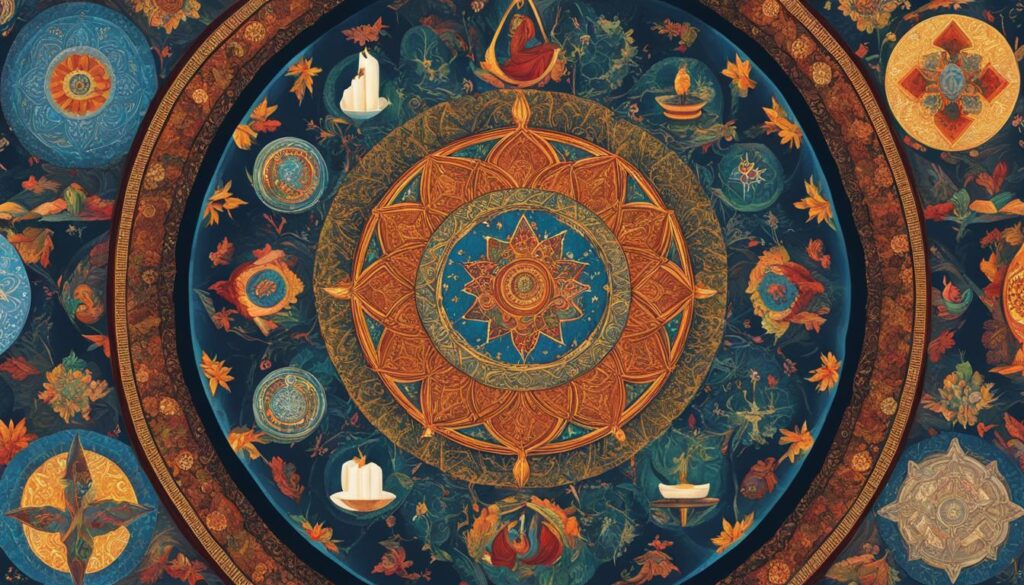We may earn money or products from the companies mentioned in this post.
Religious observances are an integral part of American society, with individuals and communities coming together to celebrate a wide variety of religious holidays and traditions throughout the year. From Christmas and Easter to Diwali and Eid al-Fitr, these observances hold significant importance for people of different faiths and beliefs.
In this section, we will provide you with a comprehensive guide to religious observances in the United States. We will explore the different religious holidays and traditions celebrated across the country, and delve into the significance and practices associated with these observances. By the end of this section, you will have a deeper understanding of the role of religious observances in American society.
Key Takeaways
- Religious observances are an important part of American society.
- These observances include a wide variety of religious holidays and traditions.
- Religious observances hold significant importance for people of different faiths and beliefs.
- Understanding religious observances is crucial to gaining insight into the diversity of American society.
- By exploring religious observances, we can gain a deeper appreciation for the customs and traditions of various faiths.
Religious Traditions: A Rich Tapestry of Faith
Religious traditions encompass a wide range of practices and beliefs that are at the core of various faiths. These customs and traditions define the way of life of believers and are passed down from generation to generation. From ceremonies and rituals to everyday practices, the diversity of religious traditions seen across the United States highlight the rich tapestry of faith that exists in the country.
Religious ceremonies and practices comprise a significant part of religious traditions. These practices can be as simple as daily prayers and can be as elaborate as grand festivals and rituals. The objective of religious ceremonies is to honor and express devotion to a higher power.
“Religious ceremonies and practices comprise a significant part of religious traditions.”
For instance, in Christianity, baptism and communion are two significant religious practices. Baptism is an essential rite of passage where believers are baptized with water to symbolize their rebirth into a new life. Similarly, communion is a ritual where believers consume bread and drink wine, representing the body and blood of Christ. These practices are observed by various denominations of the Christian faith, and they hold profound significance.
Other religious traditions like Hinduism emphasize the importance of daily prayer and meditation. Many Hindus perform puja, a daily ritual that involves lighting incense, reciting mantras, and offering flowers to deities. The objective of this religious ceremony is to connect with divine energy and seek blessings.
The diversity of religious traditions is most evident in the different festivals and celebrations observed across various faiths. These festivals offer a unique insight into the beliefs and customs of a particular religion and provide an opportunity for communities to come together in celebration.
For example:
| Festival | Religion | Significance |
|---|---|---|
| Eid al-Fitr | Islam | End of Ramadan |
| Hanukkah | Judaism | Celebrating the miracle of the oil lamps |
| Diwali | Hinduism | Celebrating the victory of light over darkness |
| Christmas | Christianity | Celebrating the birth of Jesus Christ |
These festivals offer an insight into the richness and diversity of religious traditions and highlight the importance of cultural and religious practices in American society.
In conclusion, religious traditions encompass a wide range of beliefs, practices, and customs that form the backbone of various faiths. These traditions are expressed in religious ceremonies, rituals, and festivals and offer a glimpse into the diverse and rich tapestry of faith that exists in the United States.
Celebrating Religious Holidays: Sacred Occasions
Religious holidays are sacred occasions that hold immense significance for individuals and communities who practice various faiths. These holidays are typically rooted in religious traditions and serve as a time to reflect on one’s faith, honor spiritual practices, and celebrate with loved ones.
Religious Feasts
Religious feasts are an essential part of many religious holidays. These feasts typically involve large gatherings of family and friends and are a time to share in food and fellowship. These feasts can vary depending on the religious holiday they are associated with. For example, during the Jewish holiday of Passover, people often enjoy a Seder meal that includes matzo, bitter herbs, and other symbolic foods.
Spiritual Observances
Throughout various religious holidays, spiritual observances play an essential role. These observances offer opportunities for individuals to connect with their faith, such as through prayer, meditation, or other spiritual practices. For example, during the Muslim holiday of Ramadan, individuals fast from sunrise to sunset, reflecting on their faith, and offering prayers.
Holiday Traditions
Religious holidays often involve specific traditions that add to their significance. These traditions can include lighting candles, exchanging gifts, or participating in special religious ceremonies. For example, during the Christian holiday of Christmas, many individuals participate in the tradition of exchanging gifts, which symbolize the gifts given to the baby Jesus by the three wise men.
Celebrating with Community
Many people celebrate religious holidays with their faith communities. This sense of community can provide individuals with a sense of belonging and support. Attending religious services or participating in special events can also deepen one’s connection to their faith and provide a greater understanding of its traditions and beliefs.
Religious holidays and observances hold immense significance for individuals and communities who practice various faiths. These sacred occasions offer opportunities for individuals to reflect on their faith, honor spiritual practices, and celebrate with loved ones.
Rituals and Ceremonies: Sacred Acts of Worship
Religious rituals and ceremonies are an integral part of expressing faith and worship. They hold immense spiritual significance for adherents of different religions and often mark important milestones in their lives.
Many religious traditions have specific rituals and ceremonies unique to their faith. For example, in Christianity, baptism is a significant ritual that symbolizes spiritual rebirth and admission into the church community. In Hinduism, puja is a common ritual of worship involving offerings made to deities. In Islam, the Hajj pilgrimage to Mecca is a mandatory religious obligation for all Muslims.
Religious ceremonies and rituals are typically conducted in a specific manner and with distinct objects and symbols. For example, the use of incense, candles, and holy water in Christian rituals, or the recitation of specific prayers or chants in Hinduism or Buddhism.
These rituals and ceremonies often bring people together, build community, and have social significance beyond their spiritual importance. They foster a sense of belonging and reinforce cultural identity, helping to maintain religious traditions and values over generations.
The Importance of Rituals and Ceremonies in Religious Traditions
Rituals and ceremonies hold immense importance in religious traditions, as they often serve as a means of connection to a higher power and a way to express devotion and gratitude. They can also be a way to seek forgiveness or healing, or to commemorate significant events in a person’s life.
For example, in Catholicism, the sacrament of confession is a ritual in which a person confesses their sins to a priest, who then absolves them of their wrongdoing. Similarly, in Judaism, the Yom Kippur fast is a time of repentance and reflection, with a focus on seeking forgiveness and making amends for past mistakes.
Rituals and ceremonies also help to create a sense of structure and meaning in religious practice. They often have deep historical and cultural significance, and their repeated performance allows individuals to connect with their religious heritage and ancestry.
The Role of Rituals and Ceremonies in Daily Life
Rituals and ceremonies can also play a role in daily life outside of religious practice. For example, in Japanese culture, tea ceremonies are a highly structured and elaborate ritual that are often performed in social settings. Similarly, in Western cultures, wedding ceremonies are a common ritual that mark the beginning of a couple’s lifelong commitment to each other.
These secular rituals often draw on religious traditions and can have similar symbolism and spiritual significance. They can serve to bring people together, establish social bonds, and provide a sense of shared experience and meaning.
Cultural Significance: Religious Observances in Society
Religious celebrations, practices, and traditions are an important part of American society. They not only reflect the diversity of faiths but also provide a sense of community and belonging. These observances are deeply ingrained in the cultural fabric of the United States and have shaped the nation’s history and identity.
The celebration of religious holidays brings people of different faiths together to share in the joy and reflection of these sacred occasions. For example, Christmas is a widely celebrated holiday that brings together Christians from different denominations to commemorate the birth of Jesus Christ. Similarly, Hanukkah is observed by Jews to celebrate the miracle of lights and the triumph of good over evil.
Religious practices, such as prayer and meditation, are also an integral part of many people’s daily lives. These practices provide a sense of spiritual connection and personal fulfillment that can be difficult to find elsewhere. In addition, religious practices often involve acts of kindness and charity, which contribute to the well-being of communities and society at large.
Religious traditions, whether they involve specific rituals or everyday practices, provide a sense of identity and belonging for individuals and communities. They are often passed down from generation to generation, reinforcing cultural values and customs. For example, the Islamic practice of fasting during Ramadan is a significant tradition that strengthens the bonds of the Muslim community and promotes self-discipline and spiritual growth.
In conclusion, religious celebrations, practices, and traditions play a fundamental role in shaping American society. They provide a sense of community, identity, and connection to something greater than oneself. By understanding and respecting these observances, we can appreciate the rich diversity of faiths and cultures that make the United States a truly unique and remarkable nation.
Conclusion
In conclusion, understanding the diverse religious observances and traditions observed in the United States is essential. It allows us to gain greater respect for the spiritual practices and beliefs of different communities. We hope that this comprehensive guide has given you a deeper insight into religious observances and how they impact individuals and society.
An Inclusive Society
By recognizing the cultural significance of religious celebrations, we can gain a greater appreciation for the role that faith plays in people’s lives. It is crucial to encourage inclusivity in society, promoting religious freedom for all. By doing so, we can create a stronger and more united community.
The Importance of Diversity
The diversity of religious observances in the United States should be celebrated. It is a testament to the rich tapestry of faith that exists across the country. Such diversity adds to the cultural richness and should be embraced by all members of society.
A Deeper Understanding
By understanding the significance of religious holidays and traditions, we can gain a deeper appreciation for the spiritual practices of individuals and communities. It allows us to respect the cultural differences and the importance placed on religious observances.
Thank you for taking the time to read this comprehensive guide to religious observances. We hope that it has been informative and has inspired you to learn more about the diverse faiths and practices in the United States.
FAQ
What are religious observances?
Religious observances refer to the rituals, ceremonies, and practices associated with various religious traditions. These observances often mark significant events or holidays within a particular faith.
Why are religious observances important?
Religious observances hold great importance for individuals and communities as they provide opportunities for spiritual growth, reflection, and communal worship. They also serve as reminders of religious teachings and traditions.
How many different religious observances are there?
There are numerous religious observances practiced across the United States, representing a wide range of faiths and beliefs. Some popular examples include Christmas, Eid al-Fitr, Hanukkah, Diwali, and Easter.
Are religious observances only specific to certain religions?
No, religious observances are not limited to specific religions. They can be found in various faith traditions, including Christianity, Islam, Judaism, Hinduism, Buddhism, and many others.
How do people celebrate religious observances?
The ways in which people celebrate religious observances vary depending on the specific faith and tradition. Celebrations may involve attending religious services, participating in rituals, engaging in acts of charity, spending time with family, and observing fasting or feasting.
Can anyone participate in religious observances?
While some religious observances are specific to certain faith communities, many are open to anyone who wishes to participate. It’s always respectful to familiarize yourself with the customs and practices associated with a particular observance before taking part.
How can I learn more about religious observances?
To learn more about religious observances, you can explore religious texts, consult with religious leaders or members of various faith communities, attend religious services, or engage in interfaith dialogue and educational programs.
Affiliate Disclosure: This post may contain affiliate links. If you purchase through our link, we may receive a small commission, but at no additional cost to you. For more information, please see our Disclosure statement.



